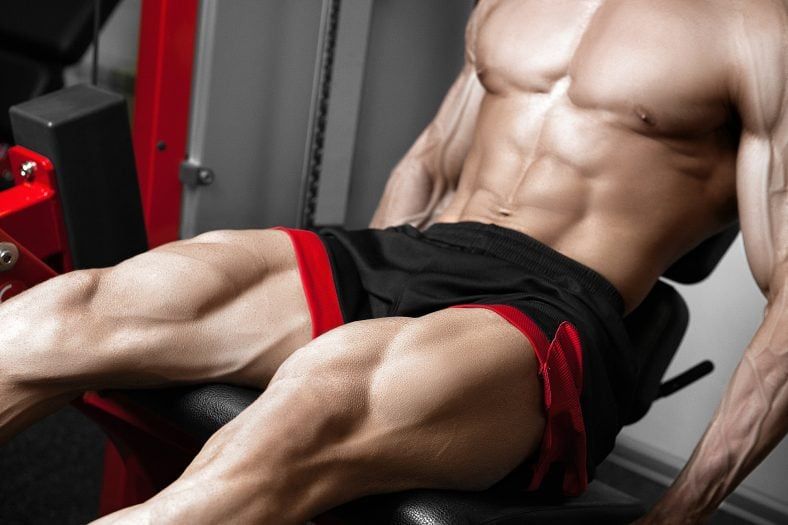Peptides for Muscle Growth: What They Are and How They Work

Table of Contents
A growing number of athletes are using peptides to maximize muscle growth. These molecules occur naturally in the human body, as well as in certain foods, such as fish and dairy. Manufacturers can also isolate peptides and sell them in liquid, spray, or vial form.
These compounds are made up of short chains of amino acids. As you already know, amino acids are the building blocks of protein. Therefore, peptides should not be confused for anabolic steroids.
As an athlete, you may use peptides to stimulate the release of anabolic hormones. Human growth hormone (HGH), for instance, may improve body composition and slow down aging. In the long run, it may increase bone density and protect against age-related bone loss.
Certain peptides increase HGH production, leading to stronger bones, fat loss, and muscle growth. These compounds may also enhance athletic performance and facilitate post-workout recovery.
Eager to find out more? Here’s what you should know about peptides and their role in sports performance!
What Are Peptides?
Peptides are small chains of amino acids that help your body make collagen and other proteins. Skincare products, for instance, may contain peptides that stimulate the formation of elastin. The peptides used in bodybuilding and other sports have anabolic effects.
Athletes use these compounds for their ability to facilitate muscle growth, recovery, or fat loss. Like SARMs, peptides support tissue repair and may improve body composition, or muscle-to-fat ratio.
Several types of peptides exist, including antibiotic, cardiovascular, anticancer, and immune peptides. These molecules are found in every cell and tissue in your body. Some act as hormones, while others regulate the inflammatory response, brain function, and more.
Neuropeptides, for example, support the proper functioning of the central nervous system. Some peptides regulate appetite, digestion, and energy metabolism. Others inhibit tumor growth and keep your immune system strong.
Bodybuilders and other strength athletes use peptides like GHRP, IGF-1, BPC 157, or PT 141. Melatonan II (M2), for example, induces a long-lasting tan response and protects against photoaging. For this reason, it’s popular among competitive bodybuilders and fitness models—but more on that later.
These compounds are considered the next big thing in medical research. As of today, peptide- and protein-based drugs make about 10% of the pharmaceutical market.
Peptides and Sports Performance
Whether you want to build lean mass or get leaner, peptides can help. As discussed earlier, these compounds occur naturally in your body. The problem is that their levels decrease with age.
As an athlete, you can use peptide-based drugs and supplements to mitigate the effects of aging and perform better at your sport of choice.
For example, some peptides boost the release of HGH and testosterone. Others exhibit antioxidant, anti-inflammatory, and antimicrobial properties. Certain peptides may help lower blood pressure and cholesterol levels.
These compounds are also prized for their ability to strengthen the bones and joints. Collagen peptides, for instance, promote bone health. Over time, they may reduce injury risk and decrease joint pain.
A 2019 study investigated the effects of collagen peptide supplementation on muscle growth. Men who used these products in combination with resistance training gained lean mass. The placebo group experienced an increase in fat mass.
The anabolic effects of peptides make them appealing to strength athletes. Moreover, peptide supplements can be used for both cutting and bulking up. The biggest challenge is to find a reputable supplier.
Types of Peptides Used in Sports
Most bodybuilders use growth hormone secretagogues, a class of peptides that increase HGH levels in the body. GHRP-1, GHRP-6, ipamorelin, anamorelin, and sermorelin are just a few examples. Other types of peptides, such as BPC 157, fight inflammation and support tissue repair.
Sermorelin, for instance, is approved for the treatment of HGH deficiency and AIDS. This peptide may also help counteract the age-related decline of growth hormone secretion.
Athletes take sermorelin for muscle growth and enhanced performance. By augmenting HGH production, this compound may aid in fat loss and improve muscle definition. It also allows you to recover faster from training and injuries.
Another popular choice is hexarelin, a synthetic HGH-releasing peptide. Clinical evidence suggests that it not only increases HGH levels but also supports cardiovascular health.
As far as its ergogenic effects go, hexarelin promotes muscle growth and repair. At the same time, it increases fat burning and improves overall strength. This makes it ideal for cutting cycles.
You’ve probably heard of oxytocin, the so-called “love hormone.” Oxytocin facilitates social bonding and induces feelings of well-being. What you may not know is that it also has a positive impact on body composition and fitness.
The peptide oxytocin reduces hunger and food cravings while increasing your metabolic rate. Moreover, it improves your body’s ability to use stored fat for fuel. When used along with regular exercise, it can help you get leaner and keep the pounds off.
Current research indicates that oxytocin may improve glucose metabolism and suppress appetite. Its effects are almost immediate. In clinical trials, the administration of a single dose reduced total food intake.
Use Peptides for Muscle Growth and Fat Loss
The above findings confirm that peptides support muscle growth, fat loss, and sports performance. Some may also protect against heart disease, obesity, diabetes, and mental disorders.
For best results, use these supplements as part of a well-rounded diet. Add kratom or CBD to the mix for increased energy. This way, you’ll not only last longer in the gym but also mitigate the effects of stress on your mind and body.
So, are you ready to crush your next workout? Browse our online shop for premium CBD oil, kratom, and other natural products that promote optimal performance!